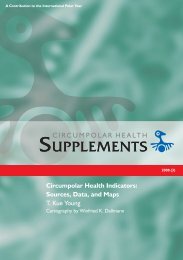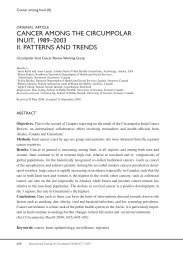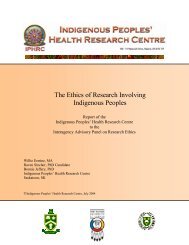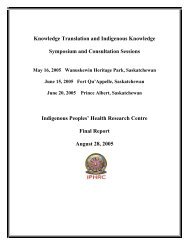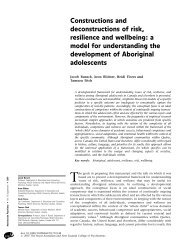EVALUATION OF THE ONTARIO COMMON ASSESSMENT ... - CCIM
EVALUATION OF THE ONTARIO COMMON ASSESSMENT ... - CCIM
EVALUATION OF THE ONTARIO COMMON ASSESSMENT ... - CCIM
Create successful ePaper yourself
Turn your PDF publications into a flip-book with our unique Google optimized e-Paper software.
OCAN Evaluation for Aboriginal Mental Health Programs<br />
sites. Participants also understood that the OCAN is based on a validated assessment tool, i.e. the<br />
Camberwell tool.<br />
Perceived Adequacy of OCAN Staff Training and Support<br />
The coordinator took part in the complete 5 day training session, composed of the coordinator training<br />
followed by the train the trainer session. The provider believed the training was extensive and sufficient to<br />
implement OCAN. However workers emphasized that there is high turnover in the Aboriginal mental health<br />
field and access to regular training is important.<br />
Current status of OCAN implementation<br />
The staff assessment is completed for each new adult client, however the self-assessment is completed only<br />
when necessary or deemed appropriate. The providers explained that OCAN appears to work well for<br />
people who need case management however, this is only a small portion of the case load at this site.<br />
Most clients access services specifically for mental health issues. Providers stated that their clients receive<br />
social support services from other agencies in their First Nation community, these include housing and other<br />
domains covered in the OCAN. They believe that clients are not looking to them as mental health providers<br />
for that type of service coordination. One provider explained it this: “by the time the clients get to me, they<br />
don’t want to get into [the OCAN domains], they know who to talk to if they need those services. They come to<br />
me for mental health counseling”.<br />
OCAN’s fit within the service delivery on Manitoulin Island<br />
Perceived importance of a standardized assessment tool<br />
Providers felt that a standardized assessment tool generally would be quite valuable, particularly if the<br />
information could be easily shared with other providers, such as hospitals, on-reserve social services providers<br />
and federally funded mental health services provides (Under First Nations and Inuit Health Branch). The<br />
importance of having access to a broad range of information related to each client was also seen as<br />
important as it could improve care.<br />
However workers cautioned that standardization would only lead to improved care if the information<br />
collected is relevant to the providers and culturally appropriate for clients.<br />
The realities of implementation OCAN into the daily workflow<br />
OCAN is creating significant duplication of work for staff at this point. Providers are concerned that the staff<br />
assessment has significant over lap with the CDS data set which they already enter into the Roxy data base<br />
as mandated by the LHIN.<br />
The providers explained that “OCAN overlaps and didn’t add anything to the normal intake we normally do.”<br />
Providers also felt that it is best used as tool during the intake process when clients are referred by federally<br />
funded workers. Once the clients are scheduled for appointments with specialized providers “they are not<br />
expecting to talk about the OCAN domains, they are expecting treatment!”<br />
Sutherland & Maar - March 2010 Page 35



